
-
 Rival South Korea camps face off as president holds out
Rival South Korea camps face off as president holds out
-
French downhill ace Sarrazin out of intensive care

-
 Djokovic cruises past Monfils as rising stars impress in Brisbane
Djokovic cruises past Monfils as rising stars impress in Brisbane
-
Montenegro mourns after gunman kills 12

-
 Sales surge in 2024 for Chinese EV giant BYD
Sales surge in 2024 for Chinese EV giant BYD
-
Agnes Keleti, world's oldest Olympic champion, dies at 103

-
 Andreeva, Mpetshi Perricard showcase Australian Open potential
Andreeva, Mpetshi Perricard showcase Australian Open potential
-
Afghan refugees suffer 'like prisoners' in Pakistan crackdown

-
 Coach tight-lipped on whether Rohit will play in final Australia Test
Coach tight-lipped on whether Rohit will play in final Australia Test
-
Blooming hard: Taiwan's persimmon growers struggle
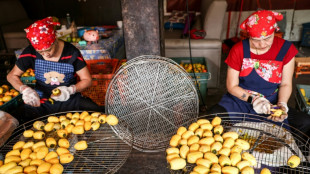
-
 South Korea's impeached president resists arrest over martial law bid
South Korea's impeached president resists arrest over martial law bid
-
Knicks roll to ninth straight NBA win, Ivey hurt in Pistons victory

-
 'Numb' New Orleans grapples with horror of deadly truck attack
'Numb' New Orleans grapples with horror of deadly truck attack
-
Asia stocks begin year on cautious note

-
 FBI probes 'terrorist' links in New Orleans truck-ramming that killed 15
FBI probes 'terrorist' links in New Orleans truck-ramming that killed 15
-
2024 was China's hottest year on record: weather agency
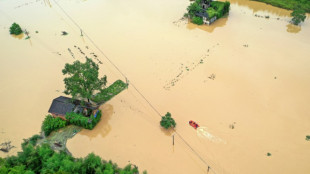
-
 Perera smashes 46-ball ton as Sri Lanka pile up 218-5 in 3rd NZ T20
Perera smashes 46-ball ton as Sri Lanka pile up 218-5 in 3rd NZ T20
-
South Korea police raid Muan airport over Jeju Air crash that killed 179

-
 South Korea's Yoon resists arrest over martial law bid
South Korea's Yoon resists arrest over martial law bid
-
Sainz set to step out of comfort zone to defend Dakar Rally title

-
 New Year's fireworks accidents kill five in Germany
New Year's fireworks accidents kill five in Germany
-
'I'm Still Here': an ode to Brazil resistance
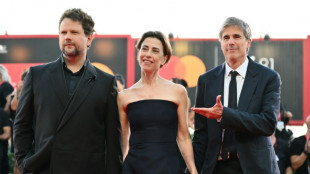
-
 New Orleans attack suspect was US-born army veteran
New Orleans attack suspect was US-born army veteran
-
Australia axe Marsh, call-up Webster for fifth India Test

-
 Jets quarterback Rodgers ponders NFL future ahead of season finale
Jets quarterback Rodgers ponders NFL future ahead of season finale
-
Eagles' Barkley likely to sit out season finale, ending rushing record bid

-
 Syria FM hopes first foreign visit to Saudi opens 'new, bright page'
Syria FM hopes first foreign visit to Saudi opens 'new, bright page'
-
At least 10 dead in Montenegro restaurant shooting: minister

-
 Arteta reveals Arsenal hit by virus before vital win at Brentford
Arteta reveals Arsenal hit by virus before vital win at Brentford
-
Palestinian Authority suspends Al Jazeera broadcasts
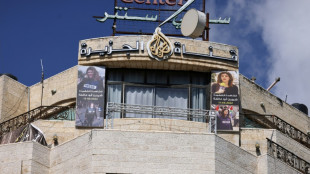
-
 Arsenal close gap on Liverpool as Jesus stars again
Arsenal close gap on Liverpool as Jesus stars again
-
Witnesses describe 'war zone' left in wake of New Orleans attack

-
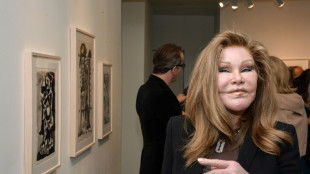 Cosmetic surgery aficionado Jocelyne Wildenstein dies aged 79: partner
Cosmetic surgery aficionado Jocelyne Wildenstein dies aged 79: partner
-
Tschofenig takes overall Four Hills lead after second leg win

-
 10 killed in New Year's truck ramming in New Orleans, dozens hurt
10 killed in New Year's truck ramming in New Orleans, dozens hurt
-
Leeds and Burnley held to draws as Windass hits Wednesday wonder strike

-
 New Orleans truck attack: what we know so far
New Orleans truck attack: what we know so far
-
Saudi executes at least 338 people in 2024: AFP tally

-
 Migrants crossing Channel to UK in 2024 soar by 25 percent
Migrants crossing Channel to UK in 2024 soar by 25 percent
-
Power restored to most of Puerto Rico: utility

-
 Seko Fofana joins Rennes after Saudi Arabia stint
Seko Fofana joins Rennes after Saudi Arabia stint
-
Brazil's Amazon saw highest number of fires in 17 years: agency

-
 McGregor wants no let-up as Celtic aim to maintain Old Firm grip
McGregor wants no let-up as Celtic aim to maintain Old Firm grip
-
Truck ramming kills 10 New Year's revelers in New Orleans, injures dozens

-
 Ten dead as man drives truck into New Year crowd in New Orleans
Ten dead as man drives truck into New Year crowd in New Orleans
-
Gaza rescuers say 15 killed in Israeli New Year strike

-
 Rugby chief backs 'trailblazer' Maher to fuel Women's World Cup fever
Rugby chief backs 'trailblazer' Maher to fuel Women's World Cup fever
-
Right-wing YouTubers back South Korea president's last stand

-
 Championship side Stoke appoint Robins as new manager
Championship side Stoke appoint Robins as new manager
-
Bangladesh saw surge of mob killings in 2024: rights groups


For the first time, Syrians 'not afraid' to talk politics
For decades, any Syrian daring to broach political topics got used to speaking in hushed tones and with a watchful eye trained for a listener among the crowd.
"There were spies everywhere," Mohannad al-Katee said in Al-Rawda cafe in Damascus, adding almost in disbelief: "It's the first time that I sit in a cafe and I can talk about politics.
"It was a dream for Syrians," said Katee, 42, a researcher in political and social history.
Until now, he like thousands of others had grown accustomed to watching for the proverbial flies on the walls of Damascus's renowned cafes.
Today, those same cafes are alive and buzzing with the voices of patrons speaking freely about their country for the first time.
Such discussions "were banned under the previous regime, then there was a relative opening during the Damascus Spring", Katee said.
He was referring to the year 2000, when Bashar al-Assad took over from his late father Hafez and slightly loosened the reins on political life in Syria.
Initially, the young Assad had opened up an unprecedented space, allowing for political salons to flourish alongside calls for reform in a country that had long grown accustomed to fear and silence.
"But it didn't last," said Katee.
A few months after his succession, Assad rolled back those gains, putting an end to the short-lived "Damascus Spring".
In the subsequent years, according to Katee, informants were ubiquitous, from "the hookah waiter to the man at the till, it could have been anyone".
- 'The walls have ears' -
Politically active since 1998, he fled to Saudi Arabia in 2012, a year after the outbreak of Arab Spring protests whose violent repression led to the eruption of the nearly 14-year civil war.
"Political life consisted of secret meetings," he said. "We were always taught that the walls have ears."
Today, "Syrians can never go back to obscurantism and dictatorship, to accepting single-party rule," he said.
A little further on, in the Havana cafe once known as a meeting point for intellectuals and activists in a distant past, Fuad Obeid is chatting with a friend.
Himself a former owner of a cafe he had to shut down, the 64-year-old said: "The intelligence services spent their time at my place. They drank for free as though they owned the place."
For over 50 years, the Assads maintained their vice grip on society, in large part through the countless informants that walked among the population.
On Saturday, Syria's new intelligence chief, Anas Khattab, announced that the service's various branches would be dissolved.
Obeid said: "I used to keep a low profile so they wouldn't know I was the owner. I told customers not to talk politics for fear of reprisals."
Now, he noted, in Havana cafe as in others, the difference is like "night and day".
- 'Truly free' -
Back in Al-Rawda, discussions are in full swing over hookahs and games of backgammon.
The owner Ahmad Kozorosh still can't believe his eyes, having himself witnessed numerous arrests in his own cafe over the years.
"I am now seeing almost exclusively new faces," he said. "People who had been sentenced to death, imprisoned."
To celebrate the new era, he is holding weekly symposiums in the cafe, and will even launch a new political party to be named after it.
Real estate agent Nesrine Shouban, 42, had spent three years in prison for carrying US dollars, a punishable offence in Assad's Syria.
Alongside thousands of others who found freedom when the doors of prisons were flung open, she was released on December 8 from the notorious Adra prison.
"They had dangled in front of us the possibility of an amnesty" from Assad's administration, she said. "Thankfully, the amnesty came from God."
"At cafes, we didn't dare say anything. We were even afraid that our phones were bugged," she said.
Now, for the first time, she said she felt "truly free".
Despite concerns over the radical Islamist background of Syria's new rulers, a breath of freedom has washed over the country for the first time, with public demonstrations being organised -- an unthinkable prospect just one month earlier.
"We are not afraid anymore," said Shouban. "If Jolani makes mistakes, we will denounce them," she added, referring to Syria's new leader Ahmed al-Sharaa, known by his nom de guerre Abu Mohammad al-Jolani.
"In all cases, it can't be worse than Bashar al-Assad."
L.E.Campos--PC
